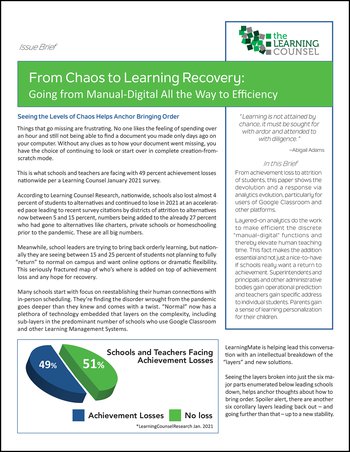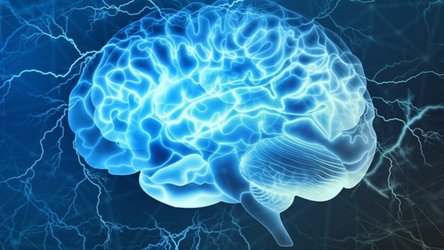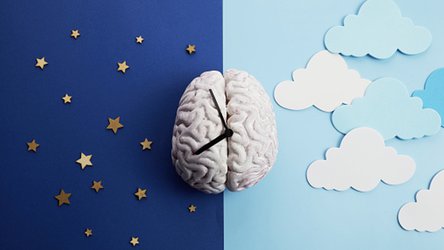Featured Articles
Good Day, Good Evening and Good Night
A lot is being written about our youngsters not getting enough sleep, particularly our high school students. In fact, many high schools have raised the time for their opening bells, hoping to gi...
Betsy Hill & Roger Stark
What’s Needed in Today’s Pandemic Era: Effective Neuroscience Intervention for Title I Students
First – A History Lesson Title I of the Elementary and Secondary Education Act of 1965 was intended to narrow the educational achievement gap for children from families with low socio-econom...
Betsy Hill and Roger Stark
What Do You Mean by “Cognitive Capacity?”
We’ve been encountering the term “cognitive capacity” more and more often since we started to make the distinction between “cognitive ability” and “cognitive capacity” a few years ago. The reaso...
Betsy Hill and Roger Stark
Can Brain Fitness be Education’s Moon Shot?
During global Brain Awareness Week, some seven years ago in March 2015, The Kennedy Forum convened experts at the Kennedy compound in Hyannis Port, MA to consider perspectives and review (then) ...
Betsy Hill & Roger Stark
Sleep and Cognitive Functioning
As the new school year begins, it is important to review some recent research about sleep and cognition. New information makes it even more clear how important sleep is to learning and memory, b...
Betsy Hill & Roger Stark
Does Your Learner Struggle with Reading Comprehension Issues?
We often hear from parents that their child struggles with reading comprehension. Their child can “read” a text, but then can’t remember what they read or answer questions or do anything with th...
Betsy Hill & Roger Stark
3 Keys to Building Individual Learning Capacity
Doesn’t everyone have the ability to learn? Of course. Learning is what our brains do. As we interact with the environment, the neurons in our brains make connections. Those connections are stre...
Betsy Hill and Roger Stark
The Particularly Pleasing Power of Neuroplasticity
As the scientific community’s understanding of the brain increases, the knowledge reaching outside the research community does too. One concept that has strong scientific consensus and is starti...
Betsy Hill & Roger Stark
Addressing the Learning Crisis Connected to the Current Mental Health Crisis
Editor’s Note: This is part two of a three-part series In part one of our series , we explored the relationship between mental health issues, cognitive skills in general, as well as the c...
Betsy Hill & Roger Stark
Cognitive Skills and Wellbeing: The Relationship
Editor’s Note: This is part one in a three-part series Wellbeing is the word that is on the tip of everyone’s tongue these days. And for good reason. It is that single, intangible state th...
Betsy Hill & Roger Stark
Cognitive Approach to Addressing the Impact of Covid-19 on Students
Schools are exploring new ways to address the impact that Covid-19 has had and continues to have on students. As leadership teams around the country consider the most effective options to help c...
Betsy Hill & Roger Stark
Learners: Happier, Healthier, Here’s How
The COVID-19 pandemic has highlighted the need to better understand and address mental health in more effective ways. According to the National Alliance on Mental Illness, “The COVID-19 pandem...
Betsy Hill & Roger Stark
The New Year and the Fine Art of Complaining
Some people just love to complain. You know them or maybe you are one of them. In an article in the New York Times Opinion section, Samantha Irby claimed, “To complain is to truly be alive.” For...
Betsy Hill & Roger Stark
Grading Your School? How do They Rate in the Science of Learning?
A number of state departments of education are working to remove the grading systems for schools that were established in the No Child Left Behind era. The idea behind those systems was tha...
Betsy Hill and Roger Stark
Should We “Teach” Executive Functions or “Teach about” Executive Functions?
In an article published in Education Week on March 1, education therapist Lexi Peterson says about executive functions: “If we treated these thinking skills as an essential part of the cur...
Betsy Hill and Roger Stark
Educator Perspectives on Social and Emotional Learning Programs
Social and Emotional Learning (SEL) continues to receive increasing attention in the world of education. In our informal conversations with principals and teachers and parents, we hadn’t disc...
Betsy Hill and Roger Stark
Closing out the Year by Curing Educational Indigestion: Three Solutions to Overly Full Plates
“Our district is currently doing a lot of work to implement STEM and our teachers feel like they are constantly having things added to their plates while nothing is removed.” If we have heard th...
Betsy Hill and Roger Stark
The Role of Cognitive Skills in Diversity, Equity and Inclusion
Diversity, equity and inclusion (DEI) are “three closely linked values held by many organizations that are working to be supportive of different groups of individuals, including people of diffe...
Betsy Hill and Roger Stark
Gamification in Education: Fostering a Growth Mindset
When the term “gamification” comes up in the context of education, it is usually introduced as a way to improve student engagement and motivation. Given the dismal state of student engagement in ...
Betsy Hill and Roger Stark
Understanding Cognitive Processing Speeds on Life’s Learning’s Highway
Cognitive processing speed (or simply processing speed) is the speed at which we can take in information and respond. Processing speed varies among individuals just like other cognitive skills ....
Betsy Hill and Roger Stark
Examining Learning Theories through the Science of Learning
Ever since human beings started passing down knowledge, we have had to make assumptions about how learning happens and how to teach so that learning occurs. And it must have been obvious from...
Betsy Hill and Roger Stark
Without Comprehension, Is It Really Reading?
Editor’s Note: This is part one of a two-part series. We often hear from parents that their child struggles with reading comprehension. Their child can “read” a text, but then can’t re...
Betsy Hill and Roger Stark
Mental Health: It’s a Cognitive Thing
Student (and teacher) mental health and wellbeing is a subject that has come to dominate education discussions. And for good reason. Wellbeing is a state that is currently elusive for both stud...
Betsy Hill and Roger Stark
Gamification and Education: Growth Mindset Games
When the term “gamification” comes up in the context of education, it is usually introduced as a way to improve student engagement and motivation. Given the dismal state of student engagement...
Betsy Hill and Roger Stark
The Impact of Cognitive Skills Training on Reading
In the first article in this two-part series , we examined the reading skills identified in “the science of reading” – that is, decoding (with an emphasis on phonics and phonemic awareness),...
Betsy Hill and Roger Stark
Why Most Students Now Need Tier 2 Support—and Why Comprehensive Integrated Cognitive Training Is the Core
In schools across the country, the number of students struggling to meet grade-level expectations has increased following the pandemic and has not responded as hoped. While Tier 2 interventio...
Betsy Hill and Roger Stark
The Age of AI Is Really the Age of the Learner
“There will be a shift in demand toward higher cognitive skills. Our research also finds a shift from activities that require only basic cognitive skills to those that use higher cognitive s...
Betsy Hill and Roger Stark
Featured Papers
The Learning Counsel presents journals, papers and briefs on critical topics in Digital Education.
Most will require registration in order to access them, but they are all free.
Addressing Crises in School Absenteeism, Staffing and Privacy: Using a human touch tech solution
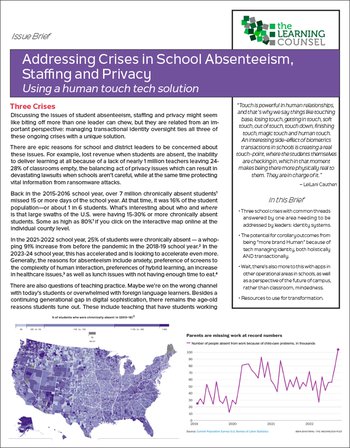
Three Near-Term Innovation Areas for K12
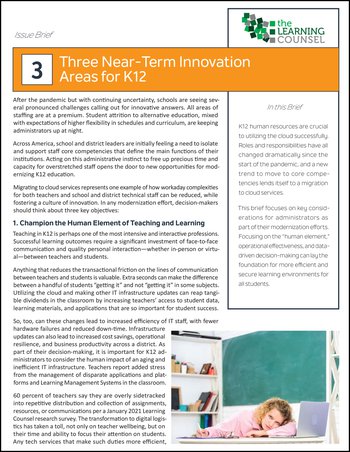
An Essential Audio Ingredient in Today’s Accessible Learning Environments
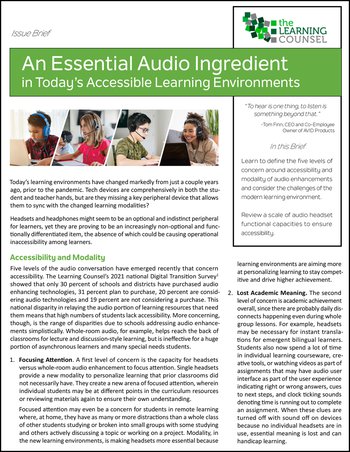
The Gaps Remaining for District Digital Transition
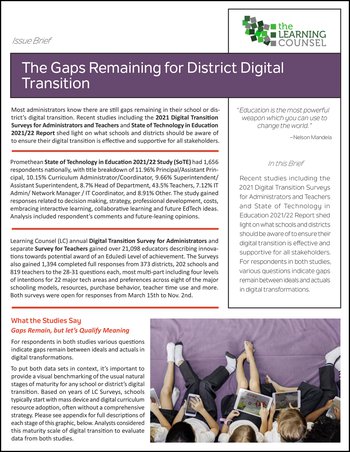
5 Steps to Fixing the Hidden Traffic of Records Management Overwhelming Schools
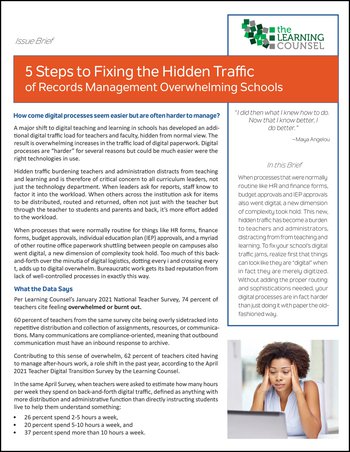
From Chaos to Learning Recovery: Going from Manual-Digital All the Way to Efficiency
